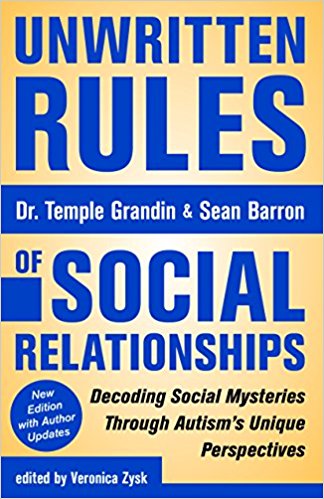Unwritten Rules of Social Relationships: Book review

Review by Kathy Kuhl
The Unwritten Rules of Social Relationships: Decoding Social Mysteries through the Unique Perspectives of Autism by Temple Grandin and Sean Barron. 383 pages. Future Horizons.
We all know people who need help learning how to get along with others. Dr. Temple Grandin and Sean Barron, two very different successful adults with autism, provide a book that can help.

Content: More than Just Rules
The core of the book is structured around ten principles for relating well with others. If I gave you the list, which includes items like, “Not Everyone Who is Nice to Me is My Friend,” you might think, “How basic!” or “I could have written that.”
But this book is a rich resource, full of insights and stories. What’s especially valuable are the insights from two articulate adults with autism, people who’ve struggled hard to grasp and apply these principles. The editor, Veronica Zysk, expertly weaves the authors’ comments together. The result reads like you are sitting at a table, listening to each of them take turns addressing a problem.
It’s occasionally a little repetitive, but as Temple says at one point, she’s repeating important points first, because they are important. The authors also repeat because, as Temple says, it is hard for people who don’t have autism to see how autistic people don’t intuitively grasp these points, and what principles must be spell out specifically and repeatedly.
Who should read this book?
- Parents of kids age four and up who are on the spectrum age or who have other social challenges
- Anyone interested in what relationships feel like to folks on the spectrum
- Teens and adults on the spectrum
- Any teens who struggle with social relationships
Structure
This book is not divided into chapters, but into three acts, like a play. In Act One, each author tells his or her story. This background is not only interesting as background for the advice ahead, but also because Sean and Temple are so different. Their backgrounds, childhoods, and careers are very different. Sean is very attuned to his emotions, Temple thinks more visually. Temple grew up in the fifties, Sean in the sixties and seventies.
Act Two explains how autistic thinking affects understanding of social situations. This is particularly helpful for parents and teachers.
The bulk of the book, Act Three, lays out the ten rules of social relationships. Each rule is explained, amplified, with many helpful additional rules, and illustrated by anecdotes from the authors’ experiences. The stories help motivate us to master the rules or to help our children master them. The sections on each rule end with a helpful two-page summary.
The section on the tenth rule, “People are responsible for their own behaviors,” like the others, has many related rules spelled out and explained in it, such as “Don’t blame others for your own mistakes,” and “You can’t control your feelings; you can learn to control your responses.” (p. 340.) This section includes mange pages specifically on anger management, with insights and suggestions from other adults with autism. The range of voices was illuminating.
Exploring the labyrinth of unspoken rules
Once again, I’ve found a book I wish had been written when I was raising my kids. I think I’d have benefited if I’d read it when I was a teen, too. You could use this book as way to crystallize your think on what your child or teen needs to learn.
It’s not a roadmap, it’s not “Ten Step to Make Loved One Act Neurotypically.” But The Unwritten Rules of Social Relationships is a very good summary of what’s important in developing good social relationships and what about that is hard to grasp for people with autism. I could imagine rereading this book several times and continuing to learn from it. If I had an older child or teen with autism, I imagine I’d be rereading it for years, as part of the core of my efforts to help my child manage the world of human relationships.
You can buy this book on Amazon with this link, and a portion of your purchase will support the pro bono work of LearnDifferently.com

